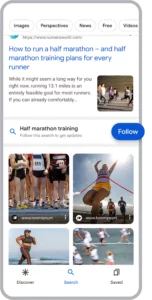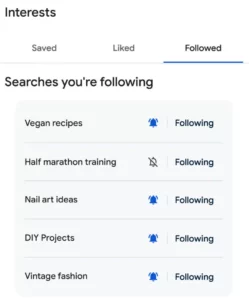December 6, 2023
Google Maps experimented with allowing users to follow individual businesses. This meant alerts for Google Posts, events, and other major updates for the local listing. Google is now taking that a step further by allowing users to not only follow specific businesses but to tailor their search experience to their personal topics of interest.
Some users will begin to see a “follow” button when viewing results for certain topics. This is aimed mostly at specific news stories and events, as those are topics that users would specifically type identical queries regarding in order to gain updated results. Google is adding a quality-of-life improvement to this process where if a user follows a story on say, a local marathon they wish to attend, Google will automatically tailor general news results to include the marathon event billboarded.

A way businesses can take advantage of this new “follow” feature, which is subscribing users to general topics as well, is to ensure that your local listings emphasise your involvement in local services and events. If you are having a sale on running gear, are giving free water out to runners, or otherwise are involved in other topics of interest to users, you must ensure that your Google Posts, attributes, and other aspects of your listing promote these facts. Users don’t just follow specific events either, they are subscribed to specific topics. If a user subscribes to “Vegan Recipes” or “Nail Art”, businesses that promote the products needed to engage in those hobbies may see a boost in rankings for those users results.

Personalized Google results are not new. Google has always determined what to show a user based on their geography, search history, and other data Google’s gathered from their device. If you try yourself to look up “jaguar”, Google will either show you the animal or the car depending on what it believes you want to see. There is no standardised Google. This is why marketing experts need to tailor our clients’ listings to what will best capture their target market. If your business is liked by everyone but loved by no one, it will rank poorly. SEO efforts need to be specific, not generalised. Google’s plan to let users follow their unique topics of interest makes this even clearer.
Explore our local search offerings
Mentioned in this article
Local SEO
Boost your visibility and connect with local customers through targeted SEO solutions.
Learn moreLocal Presence Management
Maintain accuracy and consistency across locations to improve your local presence.
Get startedTransparensee
Take control of your local listings with real-time updates and performance insights.
Explore platformExplore more local search news
Discover more DAC Insights
Explore all insightsStay forward
Subscribe to our monthly newsletter
